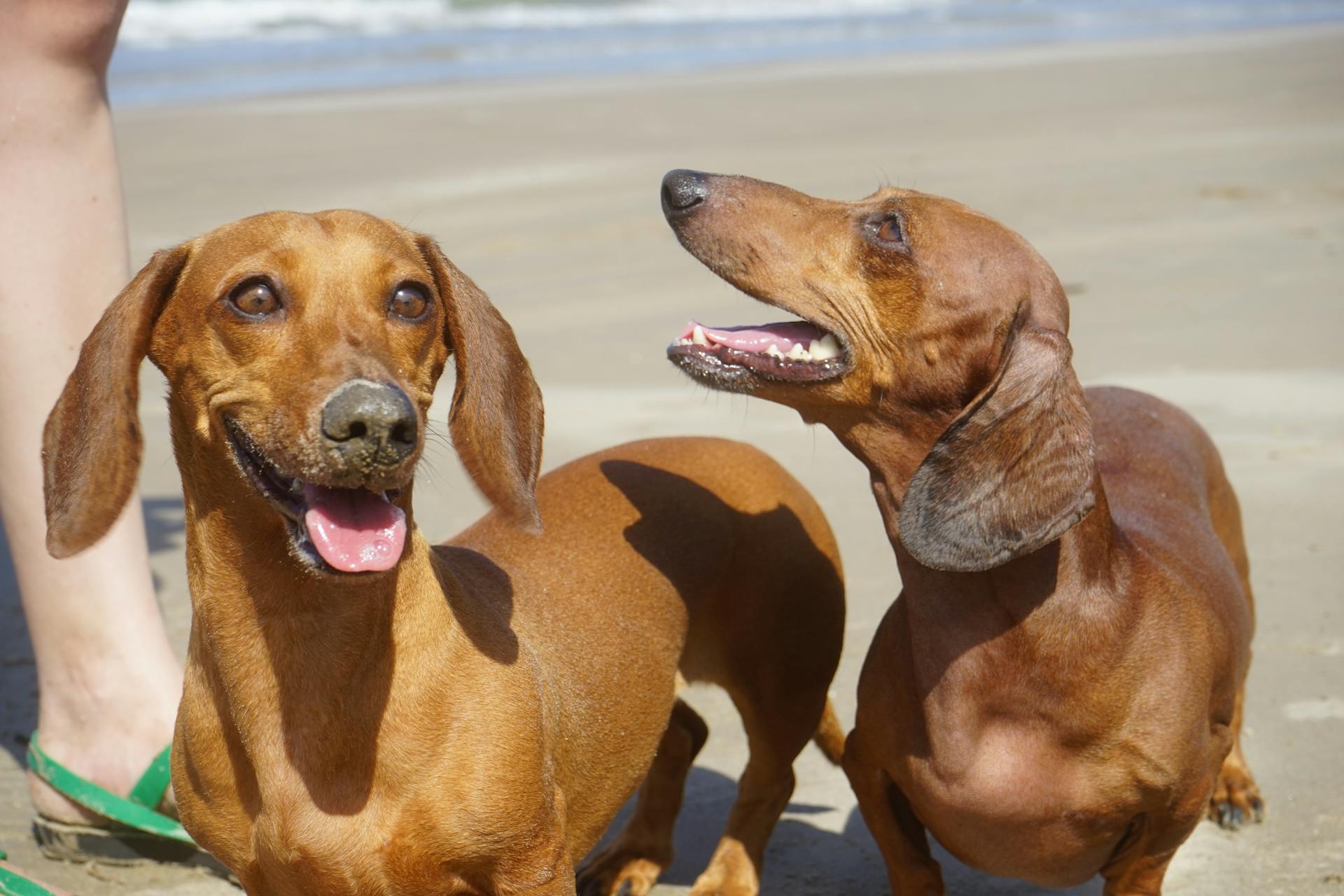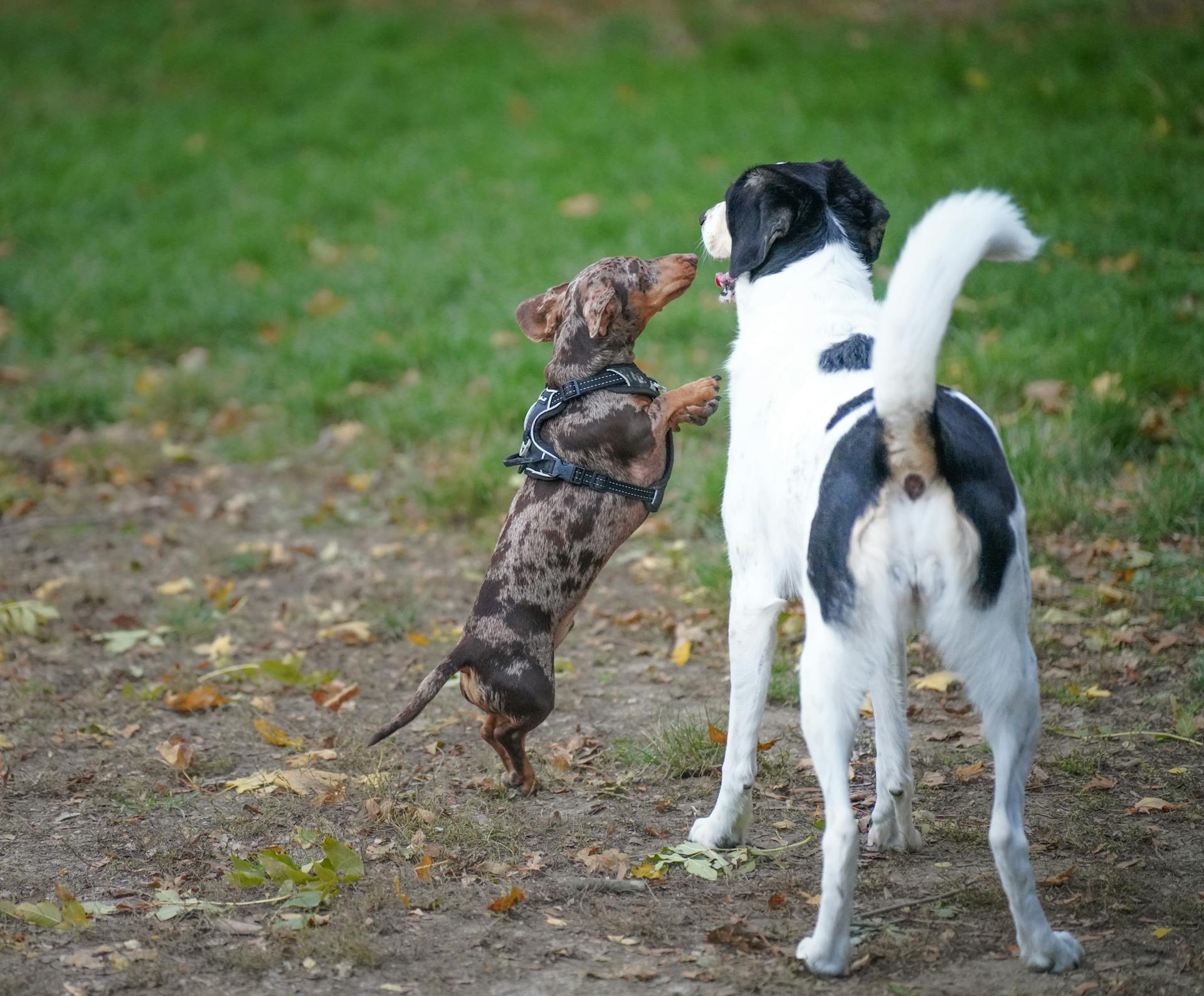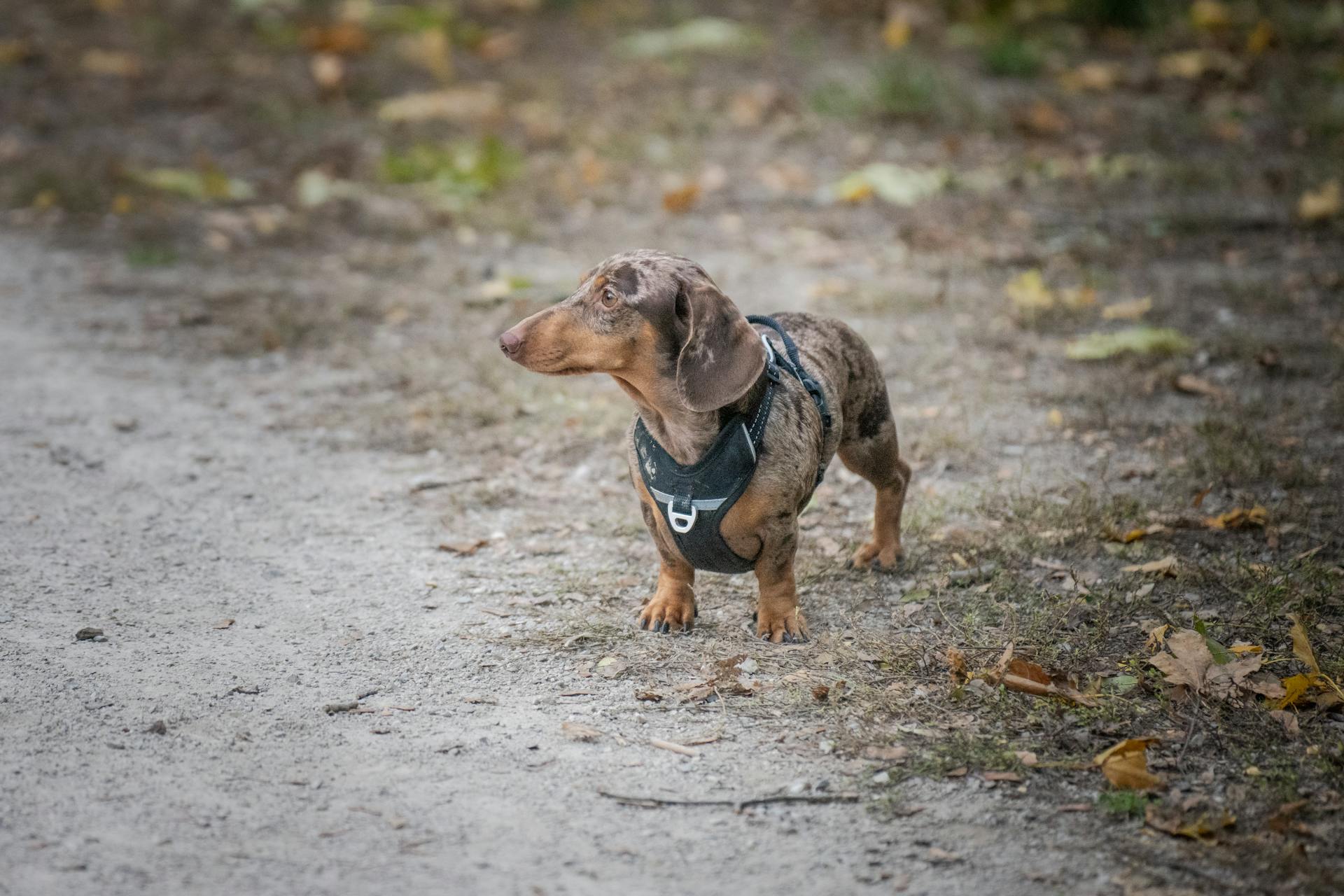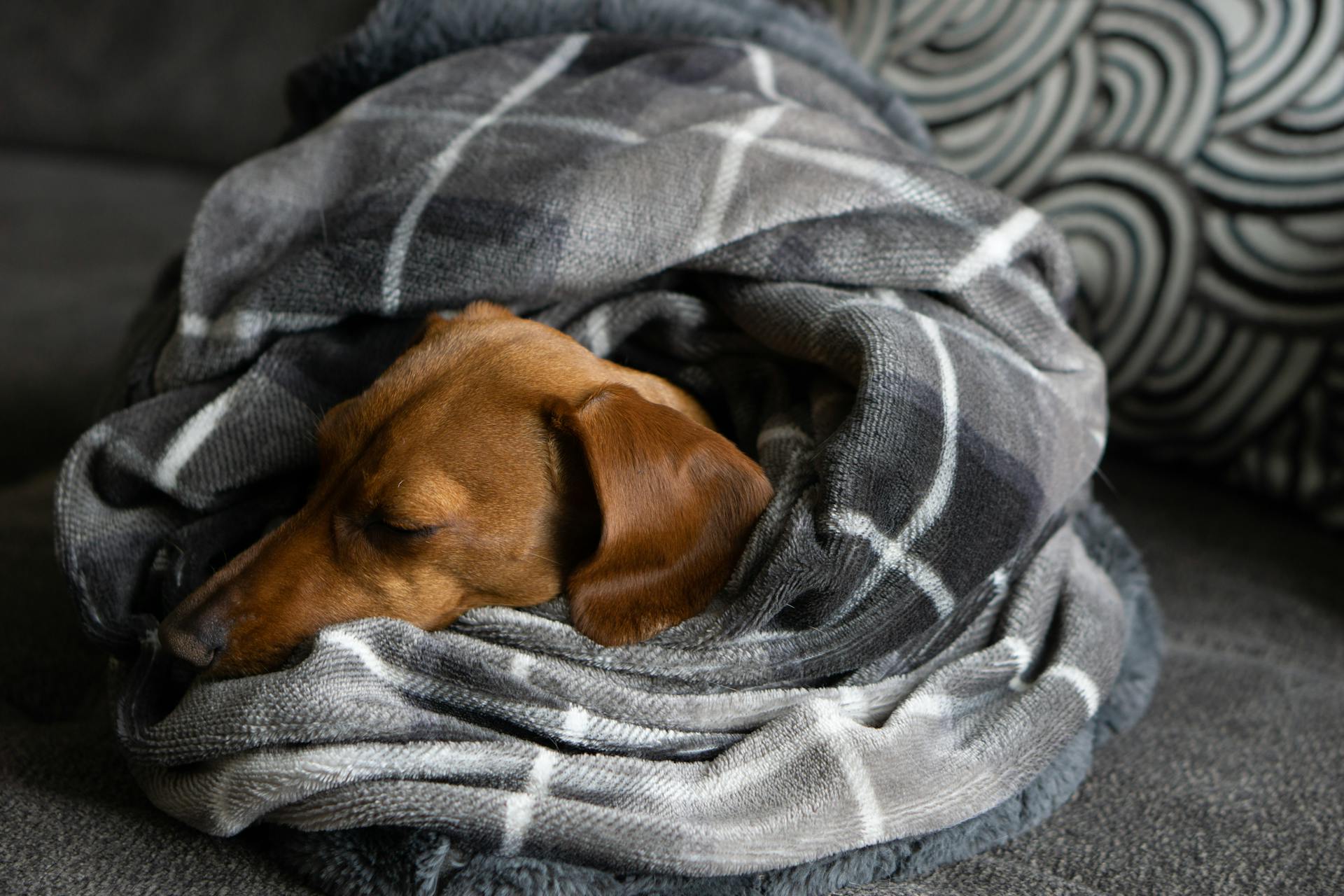
The Golden Doxiepoo is a cross between a Dachshund and a Poodle, typically weighing between 16 and 32 pounds.
Their small size requires careful consideration of living arrangements, as they need space to move around and exercise.
Golden Doxiepoos are known for their friendly and outgoing personalities, making them great family pets.
Their short coats require regular grooming to prevent matting and tangling.
Temperament & Intelligence
Golden Doxiepoos are generally friendly and welcoming to strangers, but also alert and will let you know if someone unexpected is in the yard, making them fantastic guard dogs.
They are highly social and love being the center of attention, requiring plenty of positive reinforcement and early socialization to enjoy being around other pets.
Golden Doxiepoos are intelligent and eager to please, but may also inherit the stubbornness and bullheadedness of their Dachshund parents, making training a bit more challenging.
Early socialization is vital to ensure they get along well with others, including children and other pets.
Their energy level can vary, but most Golden Doxiepoos are moderately energetic and enjoy regular walks and play sessions.
They can be big barkers, especially if they inherit the Poodle's tendency to bark at every little thing, which can be a challenge for apartment dwellers.
Golden Doxiepoos are extremely affectionate and love giving kisses, but can also be a bit jealous with all that affection, so they do best in a single-pet home.
They are intelligent and can thrive in an obedience class, but may need some extra patience and positive reinforcement to overcome their shyness.
[Children and Pets]
The Golden Doxiepoo is a loving family dog that can thrive in households with children. They are generally good with kids, tolerating gentle behavior very well.
However, it's essential to educate children on handling small breed dogs safely, as they can be easily frightened and may nip in defense. Rough behavior, like pulling on the ears or tail, will not go well with them.
Golden Doxiepoos may bark a lot when they first meet children, but with proper socialization and training, they can become great companions. In fact, they love being the center of attention, so a family with multiple members can provide them with the attention they crave.
Here are some tips for introducing a Golden Doxiepoo to your family:
- Start with gentle interactions and gradually increase playtime.
- Teach children how to handle the dog safely and respectfully.
- Supervise interactions between children and the dog at all times.
By following these tips and being patient with your Golden Doxiepoo, you can create a happy and harmonious household for everyone.
Pet Compatibility
Golden Doxiepoos are generally great with other pets, but it's essential to socialize them early to prevent any trouble. They have a strong prey drive, which means they might chase cats and small animals in the yard.
If you have a cat, it's crucial to introduce them slowly and under controlled circumstances to prevent any conflicts. In most cases, Golden Doxiepoos and cats will get along fine, but it's always better to err on the side of caution.
Doxiepoos make great pets in the right family, but they can be very needy and require a lot of attention. They thrive on regular exercise and mental stimulation, so be prepared to provide them with plenty of toys, games, and activities.
Here are some tips to promote a happy and pleasant household:
- Provide regular exercise and mental stimulation to keep your Doxiepoo happy and healthy.
- Begin training and socialization early to ensure a well-behaved and confident adult dog.
- Rotate in plenty of toys and new games on a regular basis to keep your pup mentally active.
- Maintain a consistent grooming routine to keep your Doxiepoo’s coat in good condition and prevent matting.
- Monitor your Doxiepoo’s weight, as obesity can contribute to health issues.
- Schedule regular veterinary check-ups to monitor your Doxiepoo’s health and catch any potential issues early.
- Remember dental care, as it is essential for all breeds, especially smaller ones.
- Ensure to properly educate children on handling a small breed dog safely.
Doxiepoos are generally great with children, but they can be easily frightened if handled roughly. They prefer gentle behavior and may nip in defense if they feel threatened.
If you have multiple pets, it's best to introduce them slowly and under controlled circumstances to prevent any conflicts. Early socialization is key to ensuring your Doxiepoo gets along with other pets.
Health
Golden Doxiepoos can live quite a long time, typically between 10 to 18 years.
Some health issues Golden Doxiepoos may be prone to include intervertebral disc disease (IVDD), which can cause severe pain and impair movement. This is especially true for Golden Doxiepoos with a similar stature to their Dachshund ancestors.
Luxating patella, a condition where the kneecap moves out of its normal location, is also a risk for Golden Doxiepoos. This can lead to chronic dislocation and other injuries, such as torn cruciate ligaments.
Regular exercise and a healthy weight are crucial in minimizing the risk of back injuries and IVDD. Daily walks and playtime in a fenced yard can help keep your Golden Doxiepoo happy and healthy.
Here are some common health issues Golden Doxiepoos may be prone to:
- Intervertebral Disc Disease (IVDD)
- Luxating Patella
- Glaucoma
- Von Willebrand's Disease
Yearly check-ups with the vet are essential to maintain your Golden Doxiepoo's ideal health.
Coat Color and Grooming
Golden Doxiepoos have a relatively light shedding coat that requires daily brushing to keep it free of tangles and knots.
Their floppy ears need frequent cleaning and drying to prevent ear infections, and manually brushing their teeth with pet-safe toothpaste can help slow the progression of dental disease.
A daily brushing routine will not only keep their coat healthy but also produce a shinier coat and increase blood flow to the surface of the skin.
Consider reading: Golden Retriever with Red Coat
Regular grooming is necessary to keep their coat healthy and tangle-free, and they should be brushed at least once or twice a week, depending on the length and texture of their coat.
Doxiepoos may require professional grooming every few months to keep their coat trimmed and well-maintained, especially if they have a curlier coat.
Their ears need to be kept dry, and a gentle ear cleanser or wipes should be used once every week or so to keep them clean and free of debris and bacteria.
Dental care is especially important for Doxiepoos, as periodontal disease is quite common in small breeds, and regular teeth brushing can help prevent this.
Their coat color can range from white, cream, gray, black, and brown, and their grooming needs will depend on whether they inherit the Dachshund or Poodle hair type.
Recommended read: Golden Retreiver Grooming
Exercise
Your Golden Dox needs at least an hour of exercise per day to stay happy and healthy. This can be achieved by playing with your dog, going for long hikes, jogging, or simply running around the yard.
If you have a dog park nearby, it's a great place to tire out your dog with specialized courses designed for active dogs. The Golden Dox enjoys activities like frisbee, fetch, and running.
Daily walks, about half an hour each, are necessary for preventing boredom and destructive behaviors in your Doxiepoo. They also help maintain a healthy weight and overall well-being.
Dog sports, agility work, or learning tricks can offer a fun and rewarding challenge for both you and your dog. This will provide mental stimulation and keep your Doxiepoo engaged.
The Doxiepoo has a moderate to high amount of energy and needs daily exercise to thrive. However, they don't need large spaces to run around, so a small backyard is ideal.
Regular walks or backyard playtime will provide avenues to expand your Doxiepoo's mind and prevent separation anxiety. This is especially important if you have a small backyard or live in an apartment.
Doxiepoos can get along well with family members of all ages, but it's recommended to have older children or no children to avoid accidents. With proper interaction and care, a doxiepoo can be the perfect buddy for your family.
A different take: Doxiepoo Pictures
Training
Training your Golden Dox can be challenging because this breed can often be stubborn and hard to keep focused.
Start with regular training sessions at the same time each day to get your dog into a routine. This will make it easier to keep them focused.
Short training sessions of 5-10 minutes are recommended, focusing on one command at a time.
Having plenty of treats on hand can help keep your dog motivated and engaged. Give them a treat and plenty of praise when they follow your command.
It can take several weeks before your Golden Dox learns a command, so patience and consistency are critical.
Golden Doxiepoo puppies are generally quick learners and respond well to positive reinforcement methods.
You might like: Golden Retriever Crate Training
Final Thoughts
The Golden Doxiepoo makes a fantastic family pet, especially for larger families with plenty of children to keep it busy.
If you don't have children, you'll need to set aside plenty of time each day to ensure your pet burns off excess energy, as they can become barky or gain weight if left idle.
They're very calm and make new friends quickly, but can also be stubborn and are better suited to experienced owners.
With a long lifespan, they should remain healthy without too many visits to the vet, making them a low-maintenance addition to your family.
You might like: Golden Retriever Family Dog
Size and Appearance
The Golden Doxiepoo's size can vary greatly, with some weighing as little as 10 pounds and others boasting over 30 pounds.
They can stand anywhere from 5 to 15 inches tall, paw to shoulder, making them a small to medium-sized dog.
Their size largely depends on the size of the Poodle parent, with Toy or Miniature Poodles resulting in smaller Doxiepoos.
Golden Doxiepoos can have light or dark-colored eyes, including brown and hazel tones, and noses can be black or brown.
Their curly, low-shedding coat is often well-suited for people with allergies, although no dog is completely hypoallergenic.
No two Golden Doxiepoos look alike, with their appearance influenced by a mix of traits from their Dachshund and Poodle parents.
A unique perspective: Golden Brown Labrador
Living Conditions
Golden Doxiepoos need owners who are home a lot and can give them plenty of attention, walks, and love.
They can thrive in many kinds of families, including those with seniors, families with kids, and households with other pets. However, they can be a bit loud, so it's essential to consider this if you live in close quarters or need a quiet home.

Golden Doxiepoos need a secure yard and a nice place to call their own inside. They can do well in apartments, condominiums, and smaller homes, but they shouldn't be left outside unsupervised.
Crate training can be a promising approach for Golden Doxiepoos, as they are prone to developing separation anxiety if left alone for too long. They don't like loud noises, so keeping them in a calm, secure area when alone is a must.
Golden Doxiepoos are great watchdogs and guard dogs, attentive, protective, and not afraid to get very loud to alert their owners to potential strangers.
Nutrition
Golden Doxiepoos are prone to overeating, so it's essential to keep an eye on their food intake.
Stick to high-quality food formulated for medium and small breeds, depending on your pup's size. Real animal proteins and natural ingredients are a must.
A mix of dry kibble and wet food is best, as it provides a balanced diet. Some owners choose to feed their pups fresh meals, but make sure the food has a reliable, natural meat protein source.
Doxiepoos need healthy levels of good fats to maintain energy. Be cautious not to overfeed them, as they can easily become obese.
Free-feeding is not recommended, as it can lead to overeating. Instead, give only a few treats and provide small portions, which will be around one to two cups of food a day.
Breeders & Costs
The cost of a Golden Doxiepoo can vary greatly, ranging between $250 to $2,000, depending on the bloodline and pedigree of their parents.
If you're looking to bring a Golden Doxiepoo into your family, be prepared to invest a few hundred dollars in supplies and initial setup, including crates, food, toys, blankets, and puppy pads.
Reputable breeders are essential in finding a healthy and well-cared-for Golden Doxiepoo, so be sure to ask questions about the parent dogs, previous litters, and health screenings performed.
First-year puppy costs, including vaccinations and a spay or neuter procedure, can add up quickly, so be prepared for the expenses.
Take a look at this: Doxiepoo Adult
Frequently Asked Questions
Is a Doxiepoo a good dog?
A Doxiepoo can make a great family pet for active owners, but they require attention and training to thrive. With proper care, they can be loving and loyal companions.
Do doxiepoos shed a lot?
Doxiepoos tend to be minimal shedders, but shedding can vary depending on their hair type. Those with wavy hair may shed more than those with curly hair
Do Doxiepoos bark a lot?
Yes, Doxiepoos are known to be a vocal breed, often barking to express emotions and alert their owners to external stimuli. Their barking can be frequent and enthusiastic, especially when greeting people.
Featured Images: pexels.com

